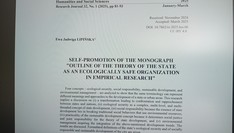The city as a business center is an organization that includes lower-level organizations along with the Internet as well as the necessary techniques and technologies, as well as an attitude towards changes in relations with clients and placed in the natural and social environment.
The purpose of the work is to justify that there is still current theorem from Rykla (2006), that The collapse of the world communist system (Second World) at the turn of the seventies and nineties of the twentieth century caused the breakdown of the political and ideological division of the world, which enabled return to the classical model of the core and periphery in the global economy system. The division is perceived in relation to the countries of Western, Central and Eastern Europe. The global economic and political system of the world has also led to the shifting of the center of gravity of development and the pace of the emergence of new cities as business centers to Asian countries (Lipińska 2018). The utilitarian purpose of the work is to initiate work on the cities' compliance with the semi-periphery and periphery of the civilization challenge of countries (and even global cities themselves) that are currently more developed. This view was expressed by Z. Rykiel (2006) claiming that the basis for meeting the civilizational challenge should be to understand that the functions constituting the core of the world system are knowledge, innovation production and management of Z. Rykla (2006). Observing the changes in the global economic and political system, it seems that one should seek an answer to the question: Is the return of the world economic and political system to small cities a form of deep ecology, i.e. a holistic view of the trend and progress in the growth of sustainable urban development seeing man as an individual in a global state? A feature of the research is their repeatability and comparability, which means that the result of the research depends on the assumptions made.
Keywords: big and small cities, ecological economics, environmental economics, sustainable development, the core of the global economic and political system, semi-periphery of the global economic and political system, the periphery of the global economic and political system, background of the global economic and political system.
Miasto jako centrum biznesu jest organizacją obejmującą organizacje niższego rzędu wraz z internetem oraz potrzebne techniki i technologie, a także nastawienie na zmiany w relacjach z klientami i umieszczoną w środowisku przyrodniczym i społecznym.
Celem pracy jest uzasadnienie, że wciąż jest aktualne twierdzenie Z Rykla (2006 s.228), iż Upadek światowego systemu komunistycznego (Drugiego Świata) na przełomie lat siedemdziesiątych i dziewięćdziesiątych XX w. spowodował załamanie się polityczno-ideologicznego podziału świata, co umożliwiło powrót do klasycznego modelu rdzenia i peryferii w systemie gospodarki światowej. Obserwuje się utrwalenie się tego podziału w stosunku do państw Zachodniej, Środowej i Wschodniej Europy. Światowy system ekonomiczno-polityczny świata doprowadził również do przesunięcia się obecnie punktu ciężkości rozwoju oraz tempa powstawania nowych miast jako centrów biznesu do krajów azjatyckich (Lipińska 2018). Celem utylitarnym pracy jest spowodowanie podjęcia prac nad sprostaniem przez miasta semiperyferii i peryferii wyzwaniu cywilizacyjnemu krajów (a nawet już samych miast globalnych) obecnie wyżej rozwiniętych. Podgląd ten wyraził Z. Rykiel (2006), twierdząc, że podstawą sprostania wyzwaniu cywilizacyjnemu powinno być zrozumienie, że funkcjami konstytuującymi rdzeń systemu światowego są wiedza, wytwarzanie innowacji i zarządzanie Z. Rykla (2006). Obserwując dokonujące się zmiany w światowym systemie ekonomiczno-politycznym wydaje się, że należy poszukiwać odpowiedzi na pytanie: Czy powrót światowego systemu ekonomiczno-politycznego świata do miast małych jest formą głębokiej ekologii, tj. nurtem holistycznego ujęcia i postępem we wzroście zrównoważonego rozwoju miast z punktu widzenia człowieka jako jednostki w państwie globalnym? Cechą badań jest ich powtarzalność i porównywalność, a to oznacza, że wynik badań zależy od przyjętych założeń.
Słowa kluczowe: wielkie i małe miasta, ekonomia ekologiczna, ekonomia środowiska, zrównoważony rozwój, rdzeń światowego systemu ekonomiczno-politycznego, semiperyferie światowego systemu ekonomiczno-politycznego, peryferie światowego systemu ekonomiczno-politycznego, tło światowego systemu ekonomiczno-politycznego.






